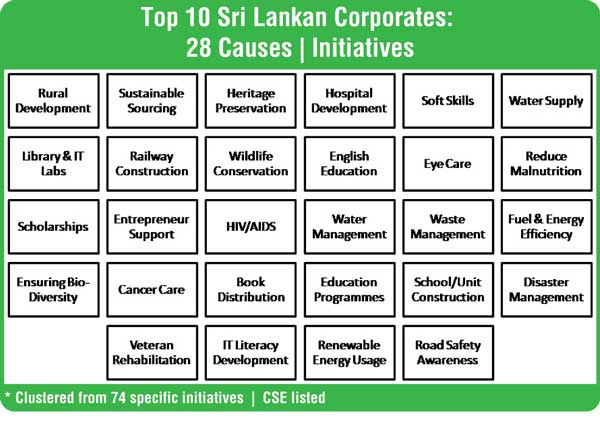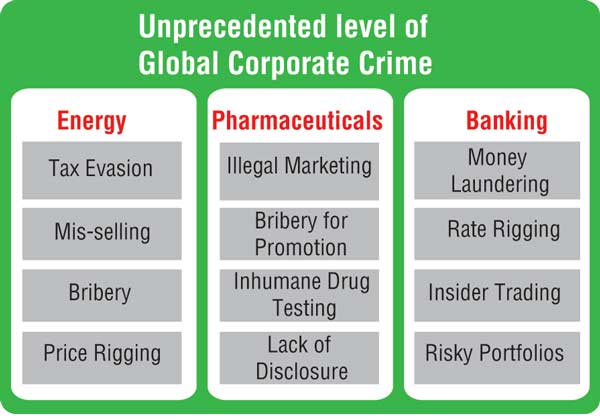
The following article is based on the keynote by MTI CEO Hilmy Cader at the Best Corporate Citizen Award organised by the Ceylon Chamber of Commerce
It’s perhaps best for us reflect again on the importance of CSR, why we engage in it, the issues of its practice and how we can greatly improve on its scope for a better tomorrow.
It’s no surprise that corporate greed is widespread. Though the definition of “corporate greed” may be quite contentious it is perhaps synonymous with the persistent linear drive for higher profits with no concern of the consequences, namely resource depletion and other various residual effects.
Poverty vs. ‘Powerty’
That’s why CSR is so important today. Closing the gap between poverty and “powerty” is pivotal in ensuring the bottom of the pyramid has a chance to begin scaling up to the top.
With the increasing amount of organisations in Sri Lanka possessing a global reach – the resources, insights, capacity and efficiency they abundantly possess means that it is no longer solely the Government’s responsibility to solve social challenges. What must be ingrained into corporate culture is the requirement of giving back to society what they so profitably reap from it.

CSR is neither justifying a loss-making enterprise nor playing Robin Hood
The real reasons for companies engaging in CSR are often masked by events glamorously awarding them for their various initiatives.
Firstly, there’s true benevolence. There’s no denying the fact that some companies do it just for the purpose of doing good. But on the other end of the spectrum, there are egotistical reasons, doing it just because everyone else is doing it and you need to have your CSR activities held on a pedestal as well.
In the last 10 to 12 years, CSR has become quite ‘fashionable’. CSR Awards may bring out the winners, but in the process end up creating the need to unnecessarily tick off initiatives, showcase and then design glossy sustainability reports.
There are then those companies that undertake CSR purely due to the guilt caused by their business operations. They realise that their core operations are immoral and so they carry out as much CSR as possible to make up for it.
Peer pressure is another driver of CSR when it’s just not right for your company to look naked when every other company has wraps a glossy CSR project around themselves.
Of course, there’s also CSR purely for the marketing and ROI that comes along with it, which often blurs the line between CSR and traditional marketing (with a social aspect).
Finally there’s the handful of companies that are actually conscious, concerned and wish to make a great contribution to society.
In the end your conscience should be the only judge of whether you really deserve a CSR award. Whether you’ve undertaken CSR for a contributory and benevolent purpose or just for its use as a marketing and motivational tool is a question only you can answer.
It is, however, important to point that CSR does not entail running a loss making enterprise simply to give back to society and further, it definitely does not mean playing “robin hood” – trying to cover up a sin through your contributions to society.

CSR – sanity or vanity?
Before carrying out CSR work, we generally assume that companies have complied, acted responsibly and do possess a high level of corporate governance. It is only then that one can assume a company is in a position to help others.
However, if we for a moment consider global corporate crime – 10 global banks in the last five years have had to pay over $ 260 billion in fines for reasons ranging from laundering money for Mexican drug lords to faking indices and exchange rates. Just one energy company has had to pay around $ 61 billion dollars in fines, which is close to the GDP of Sri Lanka, while four major pharmaceutical companies have had to pay over $ 6 billion in fines over the last five years.
We may boast about our CSR initiatives around the world, but this level of corruption is truly the reality of corporate practices today. Companies really have to “be good” before they decide to “do good”.

CSR in practice
Let’s touch on a few issues with CSR in practice, particularly in the Sri Lankan context. There’s a lot of pressure for organisations to ‘tick-off,’ because if your annual report doesn’t have an area on sustainability with glossy visuals and diagrams, then you feel quite naked.
Furthermore, there’s greater focus on how good we feel by carrying out a CSR initiative as opposed to the impact the initiative actually creates. This entire focus is based on the concept of Recipient vs. Beneficiary. Companies tend to assume a ‘hand-out’ mentality, yet does it really end up benefitting society?
Many CSR initiatives tend to be idea-driven – companies attempting to be creative with their CSR to differentiate themselves from other similar activities. Doing so however means that companies ignore the bare basics of what society actually needs from them.
One of the key issues of CSR in Sri Lanka is the abundance and proliferation of micro-initiatives. Taking the top 10 publically listed companies for example – their CSR initiatives, when clustered, fall into 28 causes, ranging from giving spectacles to water management. The problem here is that these causes are far too diverse. The issue however does not exist only at the corporate level. An analysis of Rotary clubs in Sri Lanka shows us that they spend much of their energy on around 23 causes.
Micro-initiatives ignore the dire needs of society and illustrate – that among Sri Lankan companies – there is a great lack of focus on social issues. As much as companies focus on their domains, markets and customers, their CSR too needs focus.
Lacking an understanding of human suffering essentially holds them back from conducting impactful initiatives. Do we really understand what poverty is, compared to how well we dig into and understand our consumers? Or do we simply sign a cheque and hand it out with zero understanding just because that’s the easiest thing to do?
Perhaps a reason for the abundance of micro-initiatives and the lack of understanding is that there is very little and if so, limited synergies and cooperation between companies on CSR initiatives. There really should be an award for companies that work together on initiatives compared to simply awarding them on their individual excellence.

MTI Consulting is an internationally-networked boutique management consultancy, offering advisory services in Strategy, Strategic Planning, Corporate Re-structuring, Process Re-engineering, Performance Management, International Market Entry, Feasibility Studies, Due Diligence, Corporate Finance, M&A, HR, Executive Search / Head Hunting, Marketing Strategy, Branding and Market Research.
Since the inception in 1997, MTI has worked on over 520 assignments in over 43 countries, covering a diverse range of industries, clients and business challenges.

